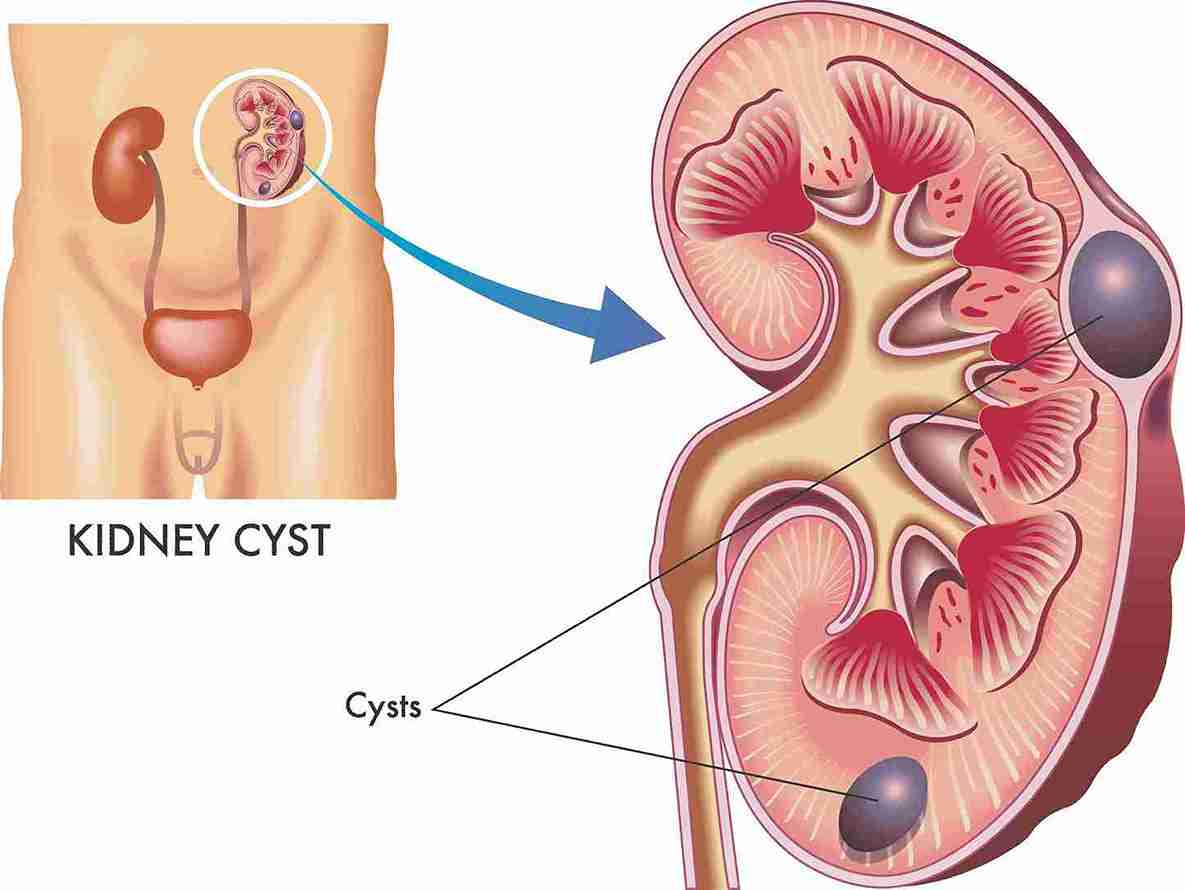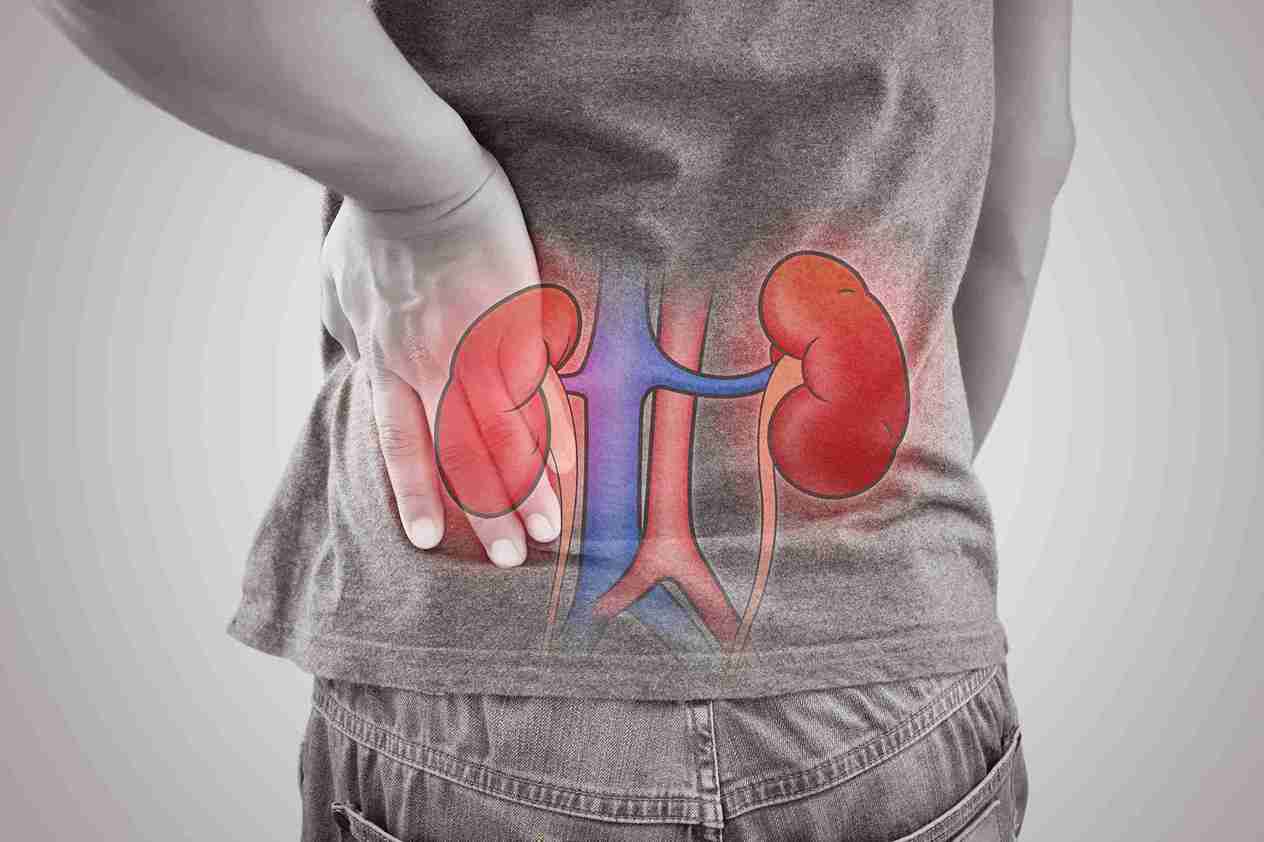CONSULTANT
CONSULTANT
Jewel Urology Center, Mumbai
Nanavati Hospital, Mumbai
Saifee Hospital, Mumbai
DR. VIVEK VENKAT
Compassionate Evidence-Based Ethical Cancer Care

WHAT ARE KIDNEY CYSTS?
A cyst is a closed sac filled with fluid. Kidney cysts generally have a thin wall
and arise from the surface or within the filters (nephrons) of the kidney.
They vary in size and are usually quite small. Rarely they may become very large and cause symptoms.
HOW COMMON ARE KIDNEY CYSTS?
Kidney cysts are very common especially as one gets older. Up to 50% of
people above the age of 50 years have kidney cysts. They usually arise in one kidney but can involve both kidneys with age. Kidney cysts can grow with time.


WHAT CAUSES KIDNEY CYSTS ?
Kidney cysts occur when fluid begins to accumulate in the tubes of nephrons
probably due to blockage of these tubes with age or injury.
Some genetic diseases (ADPKD) can cause kidney cysts however these usually manifest
early in life, cysts are multiple and always affect both kidneys.
WHAT ARE KIDNEY CYSTS TYPES?
Acquired kidney cysts are of 4 types:
Type I – Simple cysts – Harmless, <2% risk of cancer
Type II – Cysts with thin internal walls and calcification – 15-20% risk of cancer
Type III – Cysts with thicker internal walls which take up contrast – 33% risk of cancer
Type IV – Cysts with thick, irregular enhancing nodules – 90% risk of cancer


- The vast majority of cysts cause no symptoms and are detected incidentally when scans are performed for other purposes.
- Sometimes they may cause pain in the region of the kidney and if very large they may compress other organs like the stomach.
- Complications of the cysts include rupture, bleeding or infection which can cause pain, fever, or blood in the urine.
- Rarely they may affect the kidney function and cause high blood pressure.
- Cysts are diagnosed by their appearance on ultrasound, CT scan or MRI.
- In most patients simple (Type I, II) cysts need no treatment.
- Only if they are causing significant symptoms or have developed complications like bleeding, rupture or infection do they need treatment.
- If there is a suspicion of cancer (Type III and IV cysts) then a partial nephrectomy is indicated.
When do kidney cysts need to be treated?
- Surveillance – Most cysts do not need treatment and can remain on regular follow up with imaging like ultrasound.
- Aspiration – A needle is inserted under ultrasound or CT scan guidance to puncture the cyst and drain its contents. This is useful if pus has formed due to infection. Sometimes this is done for patients with very large cysts and the surgeon injects an agent to shrink the cyst (sclerosant). This treatment usually needs to be repeated.
- Cyst decortication – The cyst is drained into the abdominal cavity and its lining is then burnt. This is usually done laparoscopically or robotically and has almost no complications.
- Partial nephrectomy – This is recommended for Type III and IV cysts where there is a risk of cancer.
What are the surgical options for kidney cysts?
- Smaller incisions with less pain and scarring
- Shorter hospital stay and quick return to normal activities
- Reduced bleeding and blood transfusion rates
- Lower risk for wound infection
- Very quick procedure in cyst surgery
- Shorter ischemia time than laparoscopy and equal to open surgery which results in less kidney damage
- Much more ergonomic than laparoscopy
Advantages of robotic surgery
Robotic surgery provides significant benefits for both patient and surgeon.- What type of cyst do I have?
- Does it need treatment?
- Can the surgery be done by a minimally invasive approach?
- Basic blood and urine tests to assess fitness for surgery
- Cardiac evaluation like ECG and 2D-Echo
- To stop blood thinning medication for 5-7 days before the surgery
- Anesthesia check-up and assessment
- Healthy diet and exercise until the surgery
- Admission the day prior or day of surgery
How to prepare for kidney cyst surgery?
After your imaging and staging tests (CT scan or MRI) you will discuss your options with your urologist:To proceed with surgery the general instructions are:
- Resumption of a liquid diet within 6-8 hours after surgery and normal food the next day.
- You will also be able to get out of bed and walk a few hours after surgery.
- Pain after robotic surgery is mild and easily controlled with medications.
- You will have a urinary catheter to drain the bladder for 1 day. If a partial nephrectomy has been done the catheter may be kept longer.
- You are expected to be discharged from hospital in 1 day for cyst decortications and 3-4 days for partial nephrectomy.
- You can resume work in about 2-3 weeks after surgery.
- You can walk as much as you like but we recommend avoiding strenuous activity like lifting weights, golfing, going to the gym, etc. for 1 month after surgery.
What to expect after kidney cyst surgery?
- Cysts which are aspirated generally recur and may need further treatment.
- Cyst decortication has a high success rate with minimal complications.
- Partial nephrectomy has an excellent success rate for Type III and IV cysts (>95%).
What is the success rate of kidney cyst surgery?
-
Cyst decortication is very safe with minimal complications.
Every surgery carries a risk of complications. General complications may include anesthesia-related problems. infection, blood clots (DVT), pneumonia, cardiac events, etc.
- Bleeding: The kidney receives 20% of the blood pumped out from the heart and is a very vascular organ. Bleeding is a risk in these surgeries and transfusion may be required. In partial nephrectomy cutting through the kidney to remove the tumor can cause bleeding.
- Urine leak – if a part of the kidney which drains urine (calyx or pelvis) has been cut during a partial nephrectomy urine may leak into the space around the kidney. This generally settles by itself but rarely may need the insertion of a drain or stent.
- Injury to adjacent organs.
In addition, certain specific complications include:
Patients with significant symptoms, infection, bleeding, rupture or suspicion of cancer in the cysts need treatment.
For Type I and II (simple cysts) observation or surveillance is the recommended treatment as these cysts generally pose no harm to the patient.
It allows a very precise surgery with fewer complications, better functional outcomes and no compromise in cancer control.
For robotic surgery, pain is quite mild and easily managed with tablet medications.
Most patients are discharged in 2-3 days after the surgery.
Work can be resumed usually 2 - 3 weeks after surgery.
Usually no additional treatment is needed.
Work can be resumed usually 2-3 weeks after surgery.
Jewel Urology Center
No. 89, N. S. Road Number 1,
Navpada, JVPD Scheme,
Andheri West
Mumbai 400049, India
(m):+919136041545
Visiting Hours : Mon-Sat 4.30 - 6 pm
By appointments only
Email: appointments@drvivekvenkat.com
Phone:+919136041545
Whatsapp: +919136041545
Nanavati Max Hospital
S.V road, Vile Parle west
Mumbai 400056, India
Visiting Hours : Mon-Sat 2 - 4.30 pm
Email: appointments@drvivekvenkat.com
Phone:+919136041545
Whatsapp: +919136041545
Saifee Hospital
15/17, Maharshi Karve Rd,
Opposite Charni Road Station East,
Mumbai 400004, India
(m):+919136041545
Visiting Hours : Thursday 11am - 1 pm
By appointments only
Email: appointments@drvivekvenkat.com
Phone:+919136041545
Whatsapp: +919136041545
Terms & Conditions | Legal Disclaimer | Privacy Policy
Terms & Conditions | Legal Disclaimer | Privacy Policy
© Copyright 2021, Dr. Vivek. All Rights Reserved.
Disclaimer: The purpose of this website (www.drvivekvenkat.com) is solely for the purpose of creating awareness and imparting education regarding Uro surgery. This shall not be treated as a substitute to a professional uro surgeon's advice or prescription. Every individual and their case is different, so the results of any of the treatments mentioned on the website may vary. This website contains graphic images of before and after results of procedures, so viewer discretion is advised.

 docvivek@gmail.com
docvivek@gmail.com


